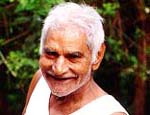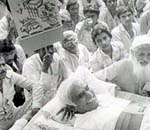|
|
| Help | |
| You are here: Rediff Home » India » News » Special |
|
 | ||
| |||||||||||||||||||||||
|
| |||||||||||||||||||||||
Baba Amte is a legend in his own lifetime. His work at Anandvan, where he spent 50 years helping and rehabilitating leprosy patients, has ensured that.
About ten years ago, Baba Amte went to Nijibal on the banks of the Narmada, and set up his ashram there. Since then, he has lived and worked amongst the tribals of the area, and has joined the agitation against the construction of the Sardar Sarovar Dam on the Narmada.
Last month, the Supreme Court passed an order, allowing the construction on raising the height of the dam after being reassured by the government of the rehabilitation to those displaced by the project. In protest, Baba Amte decided to lead a march of more than 2,500 men and women from Badwani in Madhya Pradesh, through Maharashtra and Gujarat, culminating in Delhi on April 7.
Although the marchers, who included Narmada activist Medha Patkar, and bonded labour activist Swami Agnivesh, had been promised an audience with Minister for Social Welfare Maneka Gandhi, their demonstration was stopped by the police who arrested them outside the ministry for social welfare building.
Baba Amte was himself 'arrested,' and forcibly taken to the hospital. Here, in his own words, is his description of the event, and his thoughts about what he calls the 'moral paralysis' that has, in his mind, gripped the nation:
The events of the last few days, the arrogance of the administration and the complete indifference of the people who matter in Delhi to our plight have convinced me that the whole nation is falling into a moral coma. The violence with which we were treated on the day of our peaceful protest outside the ministry of social welfare buildings at Shastri Bhawan was one such indicator.
I am old, nearly 85 years old. My legs fail me and my spine compresses further everyday. I cannot sit for any length of time. But to the policemen present at our demonstration that day, I could have been a bag of fertiliser, the way that they picked me up and threw me into an ambulance. I was taken against my will to the Ram Manohar Lohia Hospital, yet the police didn't even bother to admit me there. They just left me, on my own cot in the corridor of the hospital. Later, when the ward boys found that I was getting in the way, they left me in a corner near the urinals, where I remained for the next day.
It was only when former finance minister Professor Madhu Dandavate, who is an old friend, came and saw my sorry state, that the doctors were called in to treat me, and I was moved to a ward. All I said, was forget anything else, is this the way to treat an old man? Couldn't they have shown some consideration for an old man who is so sick?
But why am I surprised? Nowadays, if you put on the television at any time, or open any newspaper, all you see is violence. In our cities, everyone lives in fear of violence. India is today a blood-soaked nation. I feel that if in a democracy, the very agency which maintains law and order has to resort to violence on unarmed and peaceful protestors, then the nation itself is in danger.
We were on a march for human rights (manavadhikar yatra), and wanted to hold a peaceful dharna to highlight the plight of the people of the Narmada. There were no violent slogans, no expressions of aggression, yet the powers-that-be decided that they needed to arrest our men and women in this highhanded manner. Swami Agnivesh, who is an internationally respected man for his work in freeing bonded labour, was tossed aside like a useless bag of linseed. And six policemen came and picked me up, and moved me to an ambulance as if they were carrying my corpse. It was a shameless show of force.
What bothers me more is that section 144, which prohibits such demonstration, and should only be used in extreme cases, has in fact been working in Delhi for the last 362 days. Shouldn't the citizens of India worry that they are not allowed to legally express their voices in the capital of the country? It is indeed ironic that in a democracy like India, there isn't even one day in the year where we can peacefully demonstrate and argue our cause without being arrested, beaten up, or dragged off the streets.
The real problem is the administrative arthritis that paralyses our government and our politicians today. They are all attracted to power like bees to honey. I am an apiarist as well as a farmer, and I have seen the heady effect that honey has on the bee. And this is what has led to our current situation of unstable governments and horse-trading. They are all practising rajniti and not lokniti. Eventually, they will have to come back to the people. For now, at least, they have squandered the goodwill of the people of Narmada.
 If the government had in fact done all the rehabilitation that they claimed in the Supreme Court, would all these people have come to Delhi to seek justice? More than 2,500 men and women who have been displaced by the Sardar Sarovar project came to Delhi with me on my human rights march. If they had in fact been given any alternative by the government, would they have left their families, their land, and their harvests at this time of the year to come and protest in Delhi? They knew that they probably wouldn't get a hearing, but they came anyway. Because they know truth is stronger than the policeman's baton. Ignore their voices and the nation will be as turbulent as the Narmada in fury.
If the government had in fact done all the rehabilitation that they claimed in the Supreme Court, would all these people have come to Delhi to seek justice? More than 2,500 men and women who have been displaced by the Sardar Sarovar project came to Delhi with me on my human rights march. If they had in fact been given any alternative by the government, would they have left their families, their land, and their harvests at this time of the year to come and protest in Delhi? They knew that they probably wouldn't get a hearing, but they came anyway. Because they know truth is stronger than the policeman's baton. Ignore their voices and the nation will be as turbulent as the Narmada in fury.
Many people ask me if I am against all development, all technology. I can only quote Mahatma Gandhi [Images] to them, when he said that Mother Earth has enough resources to fulfill the needs of people, but not for their greed. When wishes have the upper hand in society, then you will always have discontent. Gandhiji will be even more relevant in the next millennium, with the advent of more such struggles as that of the people of the Narmada.
I know also that our struggle will succeed. Because whenever He has chosen to guide my actions with His finger, he has always cleared my path. My power is in the palm of the people you saw protesting in Delhi on April 7. I work with them, and not for them.What keeps me going despite my poor health are these two lines:
I sought my soul, but my soul I could not see, I sought my god, but my god eluded me; And then I sought my sisters and my brothers, and in them I found all three.
Baba Amte spoke to Suhasini Haidar in Delhi.
EARLIER REPORT/FEATURE:
Villagers protest against SC order on Narmada dam
'After 50 years what democracy is this?'
Rediff Specials
|
|
| © 2008 Rediff.com India Limited. All Rights Reserved. Disclaimer | Feedback |